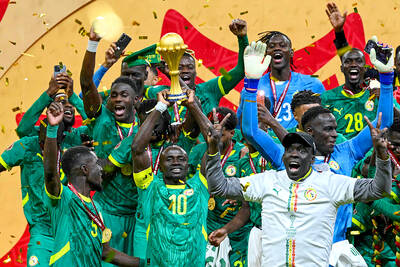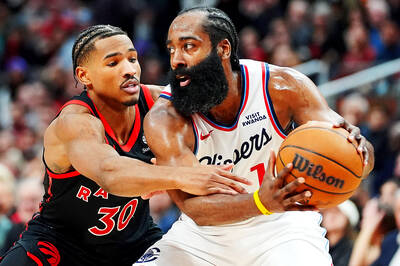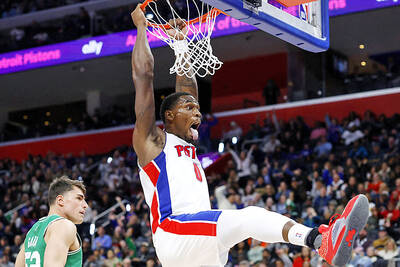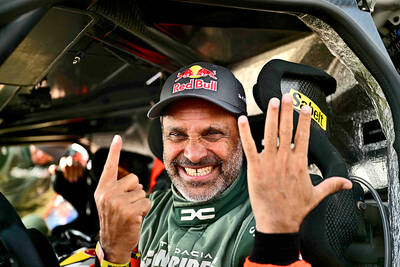Baseball must adopt tougher anti-doping rules in the US and make Major League players eligible for the Olympics to have a chance of getting back into the fold after the 2012 London Games, IOC president Jacques Rogge said yesterday.
Wrapping up a weeklong International Olympic Committee session in Singapore, Rogge also said that softball has to increase its global appeal to win back its place.
"The message is clear," Rogge said. "The IOC wants clean sport, the best athletes and universality."
Both sports were thrown out of the Olympics for 2012 on Friday in the first cut from the program in 69 years. They remain on the list for the 2008 Beijing Olympics and can reapply in 2009 for readmission at the 2016 Games.
Baseball was singled out because Major Leaguers don't play in the Olympics and the US league's drug-testing program falls way short of international standards. Softball suffered because of a perceived association with baseball and lack of global popularity.
"In the case of baseball, the best athletes are not competing and the major athletes perform in an environment where doping controls are not what we have in the Olympic world," Rogge said. "The session thought there was not enough universal appeal [for softball]."
Rogge said the two sports had not done enough to save themselves since the 2002 session in Mexico City, where the IOC put off a vote on dropping baseball, softball and modern pentathlon.
"Both sports should have read the writing on the wall in Mexico," Rogge said. "They could see that the IOC wasn't happy with the way the sports were being organized. The two sports have not worked in the interval of three years to address the concerns of the IOC."
The removal of baseball and softball leaves 26 sports on the program for London. It's the first time since the 1996 Atlanta Games that 28 sports haven't been on the list.
While some IOC members raised the possibility the committee could still bring baseball and softball back for 2012, Rogge virtually closed the door on that.
"The decision we've taken in the session is final," he said. "This is not the intention of the IOC or the session. It's a seven-year process, not a two-year process. We will not leave enough time for London or teams to prepare -- it's not a realistic option."
Rogge said the IOC would work with the two sports to put on a good show in Beijing, then give them a chance in 2009 to make their case for reinstatement in 2016.
"In four years, a federation can do a lot of improvement," he said.
Softball and baseball are sports with deep American roots, and their removal reflects the heavy European influence in the IOC. But the decision affects thousands of players around the world. Baseball, in particular, in popular in the Caribbean, Latin America and East Asia.
American IOC member Anita DeFrantz, a leading advocate for women's sports, said softball had been unfairly linked with baseball's problems. She said softball -- the only female-only sport in the games -- brings its top players to the Olympics and doesn't have a doping problem.
DeFrantz said she remained hopeful softball could still find its way back in for 2012. She suggested IOC members could reconsider their decision or the IOC could waive its rule on finalizing the program seven years before the games.
Just as stunning as the removal of baseball and softball was the IOC's rejection of the five sports in line to replace them: rugby, squash, karate, golf and roller sports. Squash and karate were nominated for inclusion, then overwhelmingly shot down in a final vote.
With a two-thirds margin required for final approval, members voted 63-39 against squash and 63-38 against karate.
"Ultimately, the session was of the opinion that none of the five sports would add extra value," Rogge said.

MARRED FINAL: As most of Senegalese players walked off the pitch after a controversial decision, some supporters threw objects and attempted to get onto the pitch Senegal on Sunday won the Africa Cup of Nations (AFCON) as Pape Gueye’s extra-time winner sunk hosts Morocco 1-0 after a chaotic final that saw the eventual champions storm off the pitch late in the game. Brahim Diaz could have won the trophy for Morocco with a controversial spot-kick in the 24th minute of added time at the end of normal time as ugly scenes broke out in the stands. However, Senegal goalkeeper Edouard Mendy easily saved the weak attempted “Panenka” chip by the Real Madrid winger, who was clearly distracted by the long delay that followed the penalty award.

James Harden on Friday scored 31 points and came up big in overtime to help the Los Angeles Clippers erase a double-digit deficit on the way to a 121-117 NBA victory over the Toronto Raptors. Harden scored 16 points in the fourth quarter and overtime as the Clippers pushed their wining steak to five games despite the absence of star Kawhi Leonard with a sprained right ankle. The Clippers trailed by 11 entering the fourth quarter, but Harden drilled a pair of free-throws with 1:24 left in regulation to tie it and after misses from both teams, they went to

Tobias Harris on Monday scored 25 points as the Detroit Pistons held off the Boston Celtics to score a 104-103 victory in their top-of-the-table Eastern Conference showdown. Harris was one of four Detroit players to finish in double figures, with Jalen Duren adding 18 points and point guard Cade Cunningham scoring 16 points with 14 assists. The win sees Detroit extend their lead at the top of the Eastern Conference to 31-10, 5.5 games ahead of second-placed Boston, who fell to 26-16 with the defeat. Jaylen Brown led the Celtics scoring with 32 points and almost snatched victory in the

Qatar’s Nasser al-Attiyah on Saturday secured his sixth Dakar Rally car title in Saudi Arabia with Luciano Benavides scraping home by two seconds to claim the motorbike title. “We’ve worked very hard since last year. I might not be showing much emotion yet, but it’s there, deep down. We are so happy to win,” al-Attiyah said at the finish. Al-Attiyah, at the wheel of a Dacia, only had to avoid a final day slip-up to top the podium after bringing his career tally of stage wins to 50 on Friday. The 55-year-old, who took clay pigeon shooting bronze at the